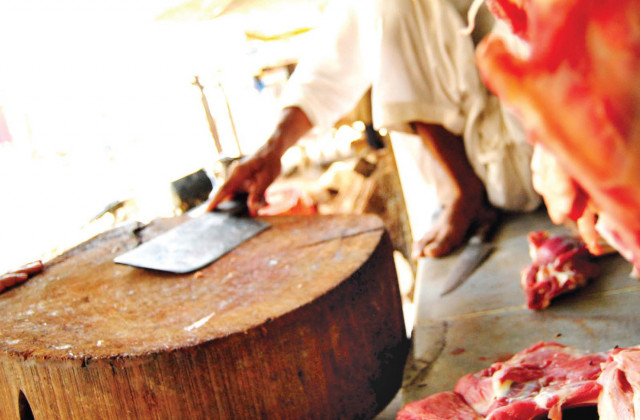Meat madness: prices skyrocket out of everyone’s reach
DCO Sukkur powerless to take action against hoarders.

Meat madness: prices skyrocket out of everyone’s reach
Since the past couple of months, the prices of daily use commodities are on the constant rise. Last week, mutton was being sold for Rs360 per kilogramme (kg) but, on Friday, it was being sold for Rs400. No one knew who ordered this Rs40 increase. Similarly, the price of beef has also increased by Rs20.
“They are raising price of beef every week and nobody asks them why,” complained a housewife, Ameena Ansari. “My husband works as a salesman at a cloth shop for Rs 8,000 per month,” she said. “His salary increases by Rs200 per year but the prices rise every day.”
Kamran Memon believed that the shopkeepers are “taking advantage of government’s slackness”. “Earlier, magistrates used to visit markets and impose a fine on profiteers but now there is nobody to stop them,” he said.
With no accountability left, Kamran felt that “the poor people have no choice but to commit suicide”. An elderly Moosa, who was standing close by also agreed. “A poor man has no right to live in this country,” he said tearfully.
Consumers may find the meat merchants as easy targets to blame, the traders also have their hands tied. A beef merchant, Muhammad Jawed, explained that since the “prices of animals are too high, we are forced to raise prices”. A cow, which could previously be bought for Rs15,000 is now being sold for Rs30,000, he said, adding that this has led people to buy only two kg of meat instead of five.
On the other hand, mutton prices are increasing because a high number of these animals are being smuggled to Afghanistan. A consumer, Asif Ali, was sure, however, that these are lies. “It is just an excuse to raise the price,” he said. “Last week, I bought mutton for Rs360 per kg and today he [the shopkeeper] is demanding Rs400,” he added. “The government is busy in political deals to perpetuate its power and its functionaries don’t care about us.”
Sharafuddin Shaikh, a clerk in a government office, said that “mutton has gone beyond the purchasing power of the middle class”. For his part, mutton merchant Kaleem Qureshi blamed the increasing price of animals as the main reason for expensive meat.
As inflation hits every nook and cranny, the poultry is one of the few sectors where prices went down by Rs45 this week. However, the prices of fruits are rising continuously even though the authorities promised that prices will come down after Ramazan.
Meanwhile, vendors cannot store vegetables for more than three days because their prices change on a daily basis. During a fight with one such vendor, Gulzar Muhammad Unnar, said that “they don’t have the fear of God because they are increasing prices everyday”. He felt the shopkeeper was overcharging him by demanding Rs50 for a kg of onions when he bought it for only Rs30, three days ago.
No one holds the wholesaler responsible, complained a shopkeeper Abdul Mateen Kamboh. The wholesalers have increased the price of a sack of onion from Rs200 to Rs300.
A wholesaler in the fruit and vegetable market in Sukkur, Abdul Khaliq, refuted these allegations. “We sell different commodities on very little profit,” he said defensively, adding that it is “the retailers who sort out small and big onions and then charge according to their will”.
Giving one example, Abdul Khaliq said that he sold a five-kg bag of lady fingers for Rs150 on Friday but it was being sold for Rs50 per kg in the retail market.
DCO Sukkur Inamullah Dharejo told The Express Tribune that he wanted to take action and control the rising prices. “We are empowered to fix the prices of daily use commodities but we don’t have the power to implement them in letter and spirit,” he said. Recently, the Sindh High Court seized the powers of magistrates, who are now powerless when it comes to penalising hoarders, he added.
Published in The Express Tribune October 30th, 2010.


















COMMENTS
Comments are moderated and generally will be posted if they are on-topic and not abusive.
For more information, please see our Comments FAQ